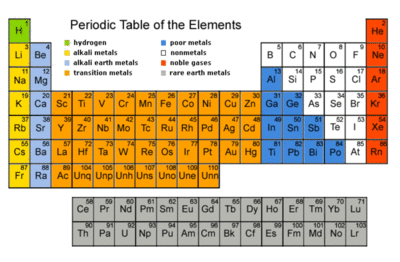Periodic Classification of Elements
While creating a resource page, please click here for a resource creation checklist
Concept Map
Textbook
To add textbook links, please follow these instructions to: (Click to create the subpage)
Additional information
Useful websites
NCERT Teaxt book
Periodic classification
Periodic table wikipedia
Reference Books
Teaching Outlines
What periodic table shows us about the teaching of science
The periodic table presents a very interesting way of understanding how science can be taught as well. I am attempting to deconstruct how this can be introduced in a class. When I discussed this in our first TCOL workshop, we had a group discussion on how this can be taught. And the different trajectories suggested by different teachers revealed our different approaches to the teaching of science.
Some of the questions raised were - what do the children need to know to be introduced to the periodic table, what is the sequence of lessons to be introduced and what do we want the students to have learnt about the periodic table. Many of the discussions centred around children having to know the electronic configuration of elements before placing them on the periodic table, students having to memorize the properties of different elements, remembering atomic number and atomic mass etc.
Some aspects I want to highlight here are - what is/are the central idea(s) of the periodic table, what opportunity does the teaching of periodic table present for the teaching of science and the role of content learning vs skill development in the teaching of science in schools and how digital resources can add to the teaching learning, and what does the periodic table tell us about how science developed.
Periodic table is a great example of how the mechanics of something was understood after it was theorized and formulated. That elements can be classified based on physical and chemical properties, that different aspects of the elements must be contributing to the chemical and physical properties, that we can predict the occurrence of elements of such and such properties and then science went on to explain why this had to be so. It is important to recognize what is the role of observing, hypothesizing and intuiting is in the doing of science. Presenting periodic table as an inquiry in the making and presenting it as a content to be learnt result in two different kinds of learning. The first method builds in children a fascination for science. And perhaps we should prefer this over a content approach. We also need to recognize that children do not need to know the electronic configuration and valencies when they have to be introduced to the periodic table - if they can approach the ideas of classification and the basis of classification, they will become curious enough to explore why the properties differ.
And to such an inquiring mind, nature will reveal her secrets.
How To Understand The Periodic Table
Unit plan
unit plan of periodic classification of element
Activity No #
- Estimated Time
- Materials/ Resources needed
- Prerequisites/Instructions, if any
- Multimedia resources
- Website interactives/ links/ simulationshttps://docs.google.com/document/d/121RDxJo1siSLx-MEKfXouILPJA_WolGV4VffrXwau1k/preview?pli=1
- Process (How to do the activity)
- Developmental Questions (What discussion questions)
- Evaluation (Questions for assessment of the child)
- Question Corner
Concept #
Learning objectives
Notes for teachers
These are short notes that the teacher wants to share about the concept, any locally relevant information, specific instructions on what kind of methodology used and common misconceptions/mistakes.
Activity No #
- Estimated Time
- Materials/ Resources needed
- Prerequisites/Instructions, if any
- Multimedia resources
- Website interactives/ links/ simulations
- Process (How to do the activity)
- Developmental Questions (What discussion questions)
- Evaluation (Questions for assessment of the child)
- Question Corner
Activity No #
- Estimated Time
- Materials/ Resources needed
- Prerequisites/Instructions, if any
- Multimedia resources
- Website interactives/ links/ simulations
- Process (How to do the activity)
- Developmental Questions (What discussion questions)
- Evaluation (Questions for assessment of the child)
- Question Corner
Project Ideas
Fun corner
Usage
Create a new page and type {{subst:Science-Content}} to use this template
